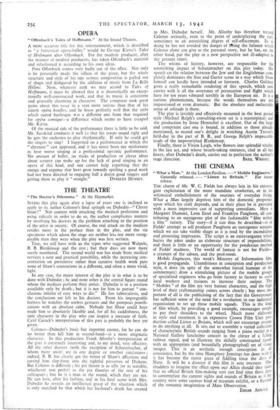THE CINEMA
" What a Man." At the London Pavilion.—" Mobile Engineers." Generally released. — " Listen to Britain." For future release.
THE charm of Mr. W. C. Fields has always lain in his extrava- gant exploitation of the more mundane crookeries, or in his whimsical embellishment of the routines of everyday living. What a Man largely deprives him of the domestic properties upon which his craft depends, and in their place he is provided with a most impressive cast of supporting comedians. Here is Margaret Dumont, Leon Errol and Franklyn Pangborn, all con- tributing to an outrageous plot of the fashionable "film within a film " variety. The story—if it can thus be described—is of Fields' attempt to sell producer Pangborn an outrageous scenario which we see take visible shape as it is read by the incredulous and protesting impresario. The script is an extravanganza which buries the jokes under an elaborate structure of impossibilities, and there is little or no opportunity for the ponderous method of Fields' madness. The world of fantasy is not for Fields— a creature of the saloon, and the pool-room.
Mobile Engineers, this week's Ministry of Information film, is good propaganda. Unambitious in conception and production style, it does (in spite of the somewhat forced humour of the commentary) draw a stimulating picture of the mobile groups of specialised engineers who go from factory to factory to assist local workers and trainees to increase their output. The " Mobiles " of the film are very human characters, and the high level of their craftsmanship comes across clearly ; but most im- portant of all is the publicising of the fact that the Government has sufficient sense of the need for a revolution in our industrial organisation to set up these mobile squads. This is the kind of film which, by providing a good example, encourages people to put their shoulders to the wheel. Much more elaborate in style and treatment is an expensive Crown Film Unit pro- duction called Listen to Britain, which will not encourage anyone to do anything at all. It sets out to assemble a varied collection of characteristic British sounds ranging from a piano recital at a National Gallery lunchtime concert to the clatter of a falling railway signal, and to illustrate the skifully constructed jigsaw with an appropriate (and beautifully photographed) set of visual images. This is an aesthetic enough conception in all conscience, but by the time Humphrey Jennings has done with it it has become the rarest piece of fiddling since the days of Nero. It will be a disaster if this film is sent overseas. One shudders to imagine the effect upon our Allies should they learn that an official British film-making unit can find time these days to contemplate the current sights and sounds of Britain as if Inc country were some curious kind of museum exhibit, or a figment of the romantic imagination of Mass Observation.
EDGAR ANSTEY.


























 Previous page
Previous page